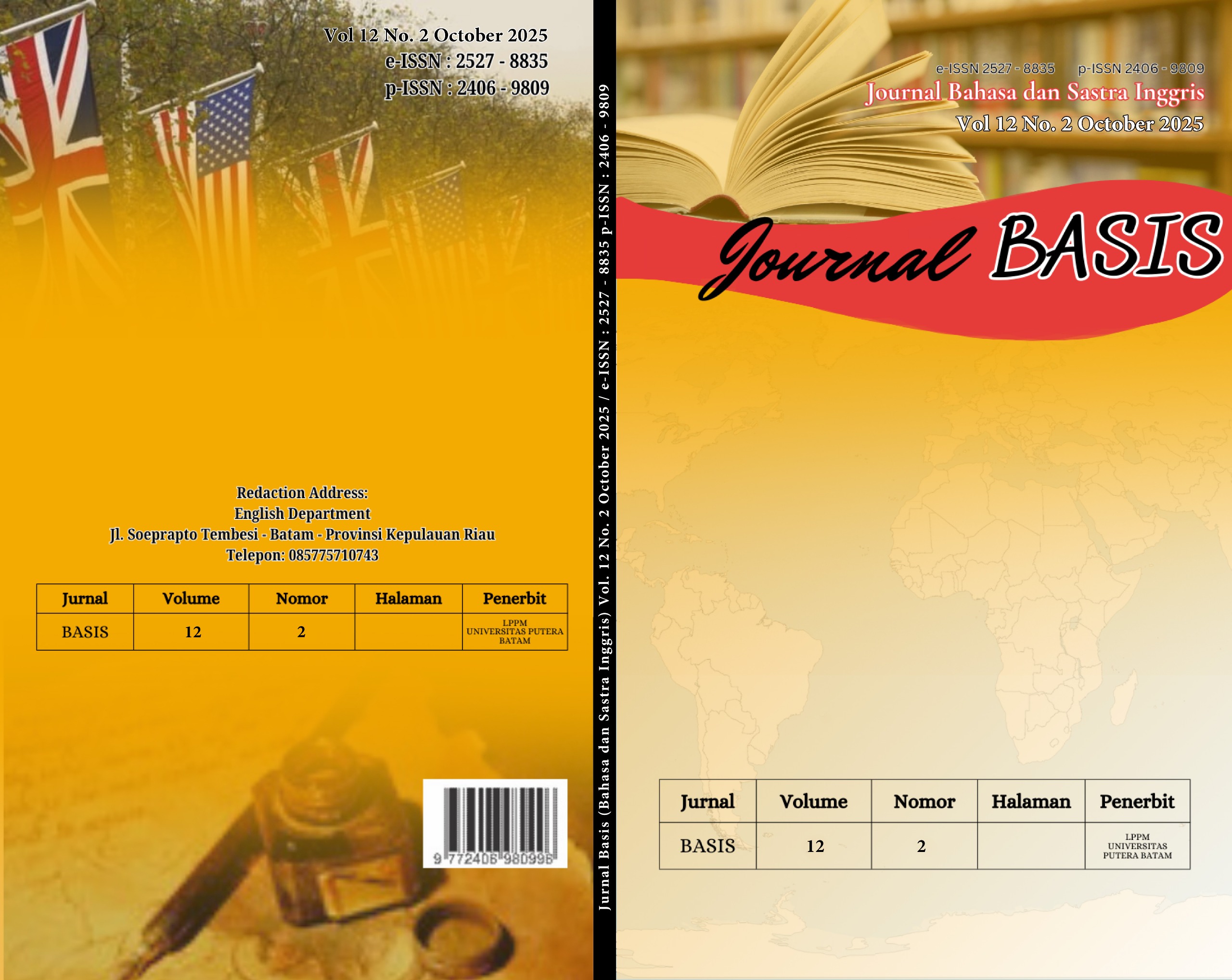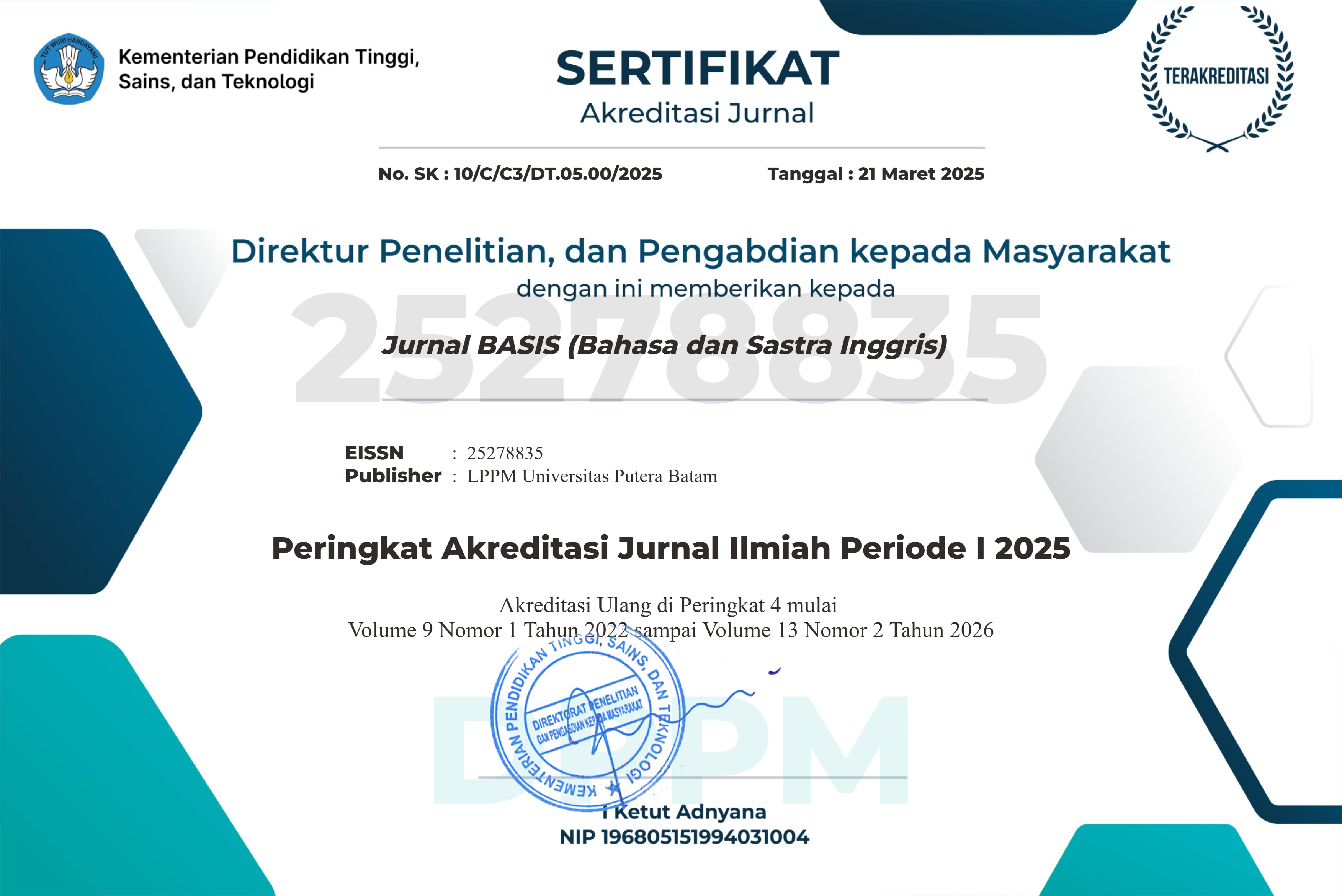GENDERED RESISTANCE AND EMOTIONAL SURVIVAL IN FAIR PLAY (2023) AND MARIE CURIE (2019)
DOI:
https://doi.org/10.33884/basisupb.v12i2.10661Keywords:
Gendered Power, Emotional Labor, Feminist Film Analysis, Comparative StudyAbstract
This study examines how gendered power struggles are represented through the female protagonists of Fair Play (2023) and Radioactive (2019). Both narratives center on Emily and Marie Curie who navigate male-dominated professional environments shaped by patriarchal norms and institutional hierarchies. The purpose of this comparative study is to deepen feminist readings of contemporary and historical female figures while fostering critically empathetic engagement with visual narratives. The research utilizes a comparative critical analysis framework, drawing on the theories of Judith Butler, Michelle M. Lazar, and bell hooks to explore how institutionalized misogyny, emotional labor, and resistance are constructed on screen. The findings reveal that both protagonists experience layered forms of marginalization, including workplace bias, emotional burden, and social surveillance. Yet, each asserts agency, Emily through reclaiming her dignity in the corporate world, and Marie Curie through intellectual defiance in academia. This study contributes to feminist film criticism by highlighting the emotional cost of women’s survival within gendered structures and underscoring the need for more intersectional and humanized portrayals of female agency in media.
References
Avci, I. B., Cetin, D. (2022). Feminist film: caramel in Research Anthology on Feminist Studies and Gender. Perceptions. pp. 585 – 594. DOI: 10.4018/978-1-6684-4511-2.ch035
Bainbridge, C. (2008). A Feminine Cinematics: Luce Irigaray, Women, and Film. London: Roehampton University. DOI: 10.1057/9780230583689
Bishara, H. (2022). Gender and Sex in the Structure of Feminist Theories: A Concept and a Development. International Journal of Language, Literature and Culture (IJLLC) https://doi.org/10.22161/ijllc
Butler, J. (1990). Gender Trouble: Feminism and the Subversion of Identity. Routledge.
Butler, J. (2004). Undoing Gender. Routledge.
Fair Play. (2023). [Film]. Netflix.
Foster, G. A. (2015). Disruptive Feminisms: Raced, Gendered, and Classed Bodies in Film. Nebraska: University of Nebraska-Lincoln. DOI: 10.1057/9781137595478
Gershon, D. (2021). Same Shame: National, Regional, and International Discourses Surrounding Shoaib Mansoor’s Cinematic Portrayal of Gender Oppression. Feminist Media Studies, 21, 4, pp. 556 – 569 DOI: 10.1080/14680777.2020.1828980
Gill, R., & Orgad, S. (2017). The Shifting Terrain of Sex and Power: From the "Sexualization of Culture" to #MeToo. Sexualities, 21(8), 1313–1324
hooks, b. (2000). Feminism is for Everybody: Passionate Politics. South End Press.
Lazar, M. M. (2005). Feminist Critical Discourse Analysis: Gender, Power, and ideology in Discourse. Palgrave Macmillan
Miller, T., Govil, N., McMurria, J., Maxwell, R., & Wang, T. (2020). Global Hollywood 2. BFI Publishing
Pérez, M. (2022). Women in Science on Screen: Biopics and Gender Politics in Contemporary Cinema. Journal of Film and Video, 74(1-2), 55-73.
Pramesti, T., & Supsiadji, M. R. (2022). Misogyny in Margaret Atwood’s Surfacing. Basis, 9(2), 247–256. https://doi.org/10.33884/basisupb.v9i2.5529
Priyashantha, K. G., de Alwis, A. C., & Welmilla, I. (2023). Gender stereotypes change outcomes: a systematic literature review. Journal of Humanities and Applied Social Sciences, 5(5), 450–466. https://doi.org/10.1108/jhass-07-2021-0131
Radioactive. (2019). [Film]. Studio Canal.
Rupp, L. J., & Taylor, V. (2018). Radicalizing Feminism: Feminist Theory and Cultural Practice. Routledge.
Sammartino, E. (2022). “You Deserve to be Satisfied”: Women in Tech and the Affective Reconfiguration of the Workplace through Song in Zoey’s Extraordinary Playlist in Palgrave Studies in (Re)Presenting Gender DOI: 10.1007/978-3-031-49576-2_9.
Shalini, L.A., Alamelu, C. (2022). The Great Indian Kitchen: Serving of an Unpalatable Tale of Male Chauvinism in Home. Theory and Practice in Language Studies, 12, 4, pp. 702-706 DOI 10.17507/tpls.1204.10
Simamora, J., & Satria, R. (2022). Woman struggles to get the equality in “Mother Courage and Her Children” Drama by Brecht. Basis, 9(2), 145–156. https://doi.org/10.33884/basisupb.v9i2.5658
Sinha, M. (2021). Male Domination and Psychological Manipulation: Toxic Masculinity in Paula Hawkins’ the Girl on the Train. Bioscience Biotechnology Research Communications, 14(8), 109–114. https://doi.org/10.21786/bbrc/14.8.27
Smith, S. L., & Cook, C. A. (2018). Inclusion in the Director’s Chair? Gender and Race/Ethnicity of Film Directors Across 1,200 Top Films. USC Annenberg Inclusion Initiative
Sutherland, J. A., Feltey, K. M. (2017). Here is looking at her: an intersectional analysis of women, power, and feminism in film. Journal of Gender Studies, 26, 2, pp. 618-631 DOI: 10.1080/09589236.2016.1152956
Tasker, Y., & Negra, D. (Eds.). (2019). Interrogating Post feminism: Gender and the Politics of Popular Culture. Duke University Press.
Taylor, L. (2021). Representing Women in Contemporary Cinema: Intersectionality and Identity. Palgrave Macmillan.
Tendenan, V. (2024). The Body as a Battlefield; A Feminist Interpretation of Mulan as a Source of Theology in the Face of Gender-Based Violence. Feminist Theology, 33, 1, pp. 445-460. DOI: 10.1177/09667350241268281
Thornham, S. (2019). Feminist Film Theory: A Reader. Edinburgh University Press.
Vial, A. C., & Cowgill, C. M. (2022). Heavier Lies Her Crown: Gendered Patterns of Leader Emotional Labor and Their Downstream Effects. Frontiers in Psychology, 13. https://doi.org/10.3389/fpsyg.2022.849566
Wajiran, W. (2024). Resilience and Liberation: Analyzing women’s resistance in No Fourth River through the Lens of Liberal Feminism. Basis, 11(2), 171–181. https://doi.org/10.33884/basisupb.v11i2.9268.
Xie, L., & Zheng, Yong. (2022). Masculinity Contest Culture and Turnover Intentions: The Roles of Work Stress and Coping Styles. Personality and Individual Differences, 199. https://doi.org/10.1016/j.paid.2022.111836













 JURNAL BASIS (BAHASA DAN SASTRA INGGRIS)
JURNAL BASIS (BAHASA DAN SASTRA INGGRIS)
